
Multi-Factor Authentication
Multi-factor authentication (MFA) is a key element of our managed cyber security package. Read more to find out how MFA can help protect your business and contact us for a no obligation cyber security consultation.
How Multi-Factor Authentication Protects Your Business
Multi-factor authentication (MFA) requires users to provide more than one form of authentication to verify their identity. For example; combining something the user knows (e.g. password or PIN) with something the user has (e.g. device or token) or something the user is (e.g. biometric data such as fingerprints or facial recognition). Some of the main ways that MFA helps to protect your business are below:
Protects Against Stolen Data
Attackers commonly steal login credentials through techniques like phishing, keylogging, or credential stuffing. Multi-factor authentication adds an extra layer of protection against stolen or compromised credentials because even if an attacker had managed to access a password, they would not have access to the additional factor (e.g., the user's mobile device) to complete the authentication process.
Safeguards Against Phishing Attacks
Phishing attacks involve tricking users into revealing their login credentials by impersonating a legitimate website or service. With MFA, even if a user unknowingly enters their credentials on a phishing page, the attacker would still require the second factor (e.g., a unique code generated on a separate device) to complete the authentication.
Protects Against Brute Force Attacks
In a brute force attack, an attacker systematically tries all possible combinations of passwords to gain access to an account. MFA helps mitigate this risk as the additional authentication factor is not easily guessed or brute forced. Even if an attacker discovers the correct password, they will still need the additional factor to successfully authenticate.
Strengthens Remote Access Security
Remote or hybrid workers access business systems or data from outside the office network, meaning MFA becomes even more critical. The additional authentication factor adds an extra layer of security to remote access, reducing the risk of unauthorised access from potentially unsecured or compromised devices or networks.
You May Also Be Interested In...
IT Packages for SMEs
All our IT packages for SMEs include FREE cyber security awareness training for your team.



